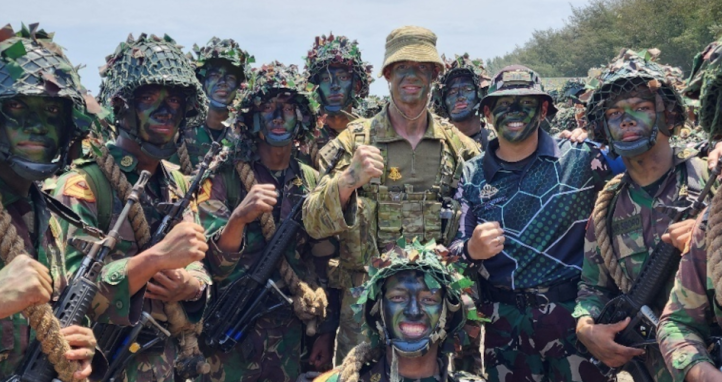Considering the prevalence of suicide and other forms of self-harming behaviour within the ADF and the veteran community, and the recently announced Royal Commission into the epidemic of veteran suicide, it is an oversight that relatively little attention has been paid to the development of suicide prevention skills. All Defence members should train in suicide awareness and prevention to help keep our mates ‘safe for now’, until they can be linked to other caregivers who can address the deeper concerns of a person identified as being at risk for suicide.
The purpose of this short article is to raise awareness of our need to develop ‘intervention and prevention’ skills to aid us when we come into contact with someone who is considering suicide and/or self-harm.
Caveat:
Anyone who requires mental health support is reminded that there are a multitude of resources out there both within and external to Defence, and that, in the first instance, seeking professional help is highly recommended.
Australian Defence Force Suicide Prevention Program
As stated in the introduction to Australian Defence Force Suicide Prevention Program (ADF SPP), 'A Defence member’s reactive stress to factors (such as interpersonal trauma, vocational, financial, and/or legal difficulties) can precipitate suicide, self-harm, or harm to others. Suicide and self-harm behaviour can also be associated with a number of psychiatric disorders including depressive and personality disorders and substance misuse.'[1] The stated stress factors can be enhanced when placed in environments away from usual support mechanisms (i.e. family and friends) when away for long periods of time during training (such as ab initio or promotion courses), exercises and deployments.
The ADF SPP notes that, 'seeking help for suicidal behaviour can be a complex and sensitive issue for a Defence member.' The reasons for this are varied and very much differ dependent upon the individual; however, the stigma around suicide and the fear of being medically downgraded and therefore non-deployable are commonplace.
The ADF SPP comprises of four levels of Suicide Prevention Training:
- Level 1: Introductory Suicide Prevention Training
- Level 2: Keep Your Mates Safe- Suicide Prevention Training (KYMS-SPT)
- Level 3: Suicide First Aid - Applied Suicide Intervention Skills Training (ASIST)
- Level 4: Clinical Up-skilling- Suicide Risk Assessment Training (SRAT)
Joint Health Command details that 'Delivery of ASIST in Defence is primarily targeted at junior leaders, commanders and managers, and health professionals and Chaplains but is also open to all other interested personnel'.[1] The messaging could potentially be revised here, as the natural human reaction to difficult topics such as suicide is usually to avoid them, therefore the ‘other interested personnel’ statement could be used as an excuse to avoid undergoing the course due to someone stating that they were simply ‘not interested’.
It is fantastic that the ADF has something like the ADF SPP; however, like a lot of programs, policy and procedures, it can often be lost to the majority unless it is adequately promoted and utilised. Furthermore, the majority of people have pre-conceived notions about suicide, and it’s not a topic that is willingly discussed for the reasons outlined above, including the very real fears of medical downgrade. It’s a subject that is preferred to be ignored in the hope that it will not have to be dealt with. This essentially means that there is a natural reluctance for people to volunteer for training that covers topics as confronting as suicide – until, tragically, ADF members and their families have been directly affected by it. I note (in my experience) that the majority of people who have volunteered for suicide awareness and intervention training have been directly affected by someone who has been either at risk of suicide, or has made an attempt (whether successful or not).
I would also like to note that one of the main supervisory roles stated in the Joint Health Command pamphlet on ADF Mental Health & Wellbeing: Suicide, is that supervisors should... 'actively support suicide intervention efforts and recognise that suicide prevention/intervention requires effort from all members of the ADF.'[2] This statement alone is reinforcement of the fact that there should be a mandatory training element involving suicide intervention for all Defence personnel.
Applied Suicide Intervention Skills Training (ASIST)
One of the most beneficial training opportunities that is available (which I recently attended for the second time) is the Applied Suicide Intervention Skills Training. The training goes beyond the theories provided in mandatory suicide awareness training, which assists soldiers in looking for the signs of suicide in co-workers and peers. ASIST provides leaders and caregivers with not only the ability to identify cues of someone who is potentially at risk of suicide and ask the direct questions (such as, 'are you considering suicide?'), but also more specific suicide intervention skills to meet the needs of the person at risk. The highlight of the training was the extensive practice of scenarios following the ASIST Pathway for Assisting Life (PAL) during an intervention (Connecting with Suicide, Understanding of Choices and Assisting Life) to meet the needs of the person at risk and ultimately keep them safe until they can get further help. The scenarios were as realistic as possible whilst still maintaining a supportive and safe environment for participants. This is a vital aspect of the ASIST package, given so many ADF personnel have sadly experienced a co-worker who has attempted self-harm or suicide.
Two of my subordinates who volunteered to attend the ASIST training provided the following comments:
Soldier A:
'I found the ASIST course has taught me extremely valuable and beneficial skills not only for myself as a soldier but in everyday life. I believe the course has given me important tools to utilise, and should I ever be in the circumstance, I would feel confident in assisting anyone as a result of this course.'
Soldier B:
'The ASIST course provides greater knowledge to the person who can then help and be more aware in the work environment as well as personal life.'
Living Works, the creators of the ASIST program, founded it on the principle that everyone can make a difference in preventing suicide. They state, 'The more people in the community who have suicide intervention training, the more likely it is they will be able to identify someone at risk and intervene to keep them safe.'[3]
The key learning outcomes from ASIST are as follows [4]:
- Learn to see, hear and respond to signals,
- Improve your skills for working with people at risk to increase immediate safety and get further help.
- Recognise when someone may be thinking of suicide.
- Respond in ways that clarify and address suicide risk.
- Understand why suicidal thoughts are present.
- Work together to review risk and increase safety.
There are many professional organisations external to Defence that have determined that suicide intervention skills are essential for their work, and therefore make training such as ASIST compulsory for their workers (examples are: nurses, physicians, mental health professionals, pharmacists, teachers, counsellors, youth workers, police, first responders, correctional staff, school support staff and clergy).
Suicide intervention training does not target or fix the stress triggers that have brought the person at risk to the point of thinking about suicide, however it provides us the skills to apply 'suicide first aid' by helping the individual switch their focus to a safe mindset to keep them ‘safe for now’, then linking them to family, friends or other caregivers who can guide them towards addressing the deeper issues that led them towards suicidal thinking.
At this point in time, ASIST (or training on suicide intervention in general) is not mandatory for Defence members. I am convinced, after 20+ years of serving in ADF, that suicide intervention training should be integral to the Defence Force Preservation Awareness Cycle to enable all members to learn how to intervene and help prevent the immediate risk of suicide. This would mean that all Defence personnel would be provided with the skills necessary to identify personnel at risk of suicide and intervene to the point of helping someone develop a safe plan to keep them ‘safe for now’, until they can be linked with avenues for additional help and support as identified in their safe plan.
What we can do as individuals:
As Defence members, we are bound to adhere to requirements in Defence policy. As human beings; however, we can strive to be compassionate, show understanding, develop and utilise soft skills in intervention in order to keep our mates ‘safe for now’ until we can get them suitable help and support in accordance with their safe plan, and ultimately be effectively supported with the goal of recovering to continue contributing to Defence and the broader community.
Although Defence has the ADF SPP, there is an opportunity for a bottom up approach for the acquisition of soft skills in suicide intervention where we all can seek opportunities for training not only through our chain of command for military-run opportunities, but there are also several opportunities run outside of Defence as well which are often provided free to those seeking to help family, friends, co-workers or others in the veteran community. These include many options available through Open Arms.[4]
Final Thoughts
Suicide awareness and intervention is everybody’s business. I believe that Defence could take a more proactive approach by ensuring that training in suicide intervention (such as the ASIST course) is provided as a mandatory topic as part of the Force Preservation Awareness Continuum. But programs alone do not save lives, people save lives. ‘Buy in’ from all members is required in order for any training to be effective. The more we develop skills in suicide intervention, the more we can help to minimise the risk of suicide within Defence. One person can make a difference, and if we can keep our mates ‘safe for now’ and link them to other caregivers who can assist them with addressing their deeper concerns, we have taken the right steps towards keeping our mates safe for the long term. A more effective education for all in suicide awareness and intervention not only provides people with the ability to recognise the signs of another person at risk of suicide and help them, but it enables the ability for someone to look inwards and identify signs within themselves and then seek help for themselves before the issue becomes overwhelming.





I appreciated doing ASIST as a chaplain and have used its principles.
But I have also appreciated hearing from other members in units about how useful they found it and how they have also used it to support others on pathways towards staying safe and choosing life.